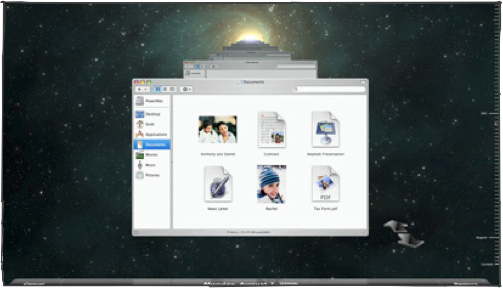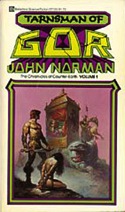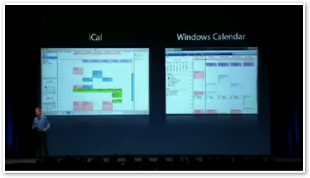





Microsoft apologist Paul Thurrott is doing his very best to scribble up a negative spin on Apple's WWDC Leopard announcements. Poor Paul! After five years of Longhorn waiting and regular Vista disappointments, his very best attempts at poo-pooing Leopard sound a lot like sour grapes.
In the previous article, Three Reasons Why Microsoft Can't Ship (and Apple can), I described why Thurrott is so bitter about Leopard: Apple has been shipping so much innovation while Microsoft struggles to deliver any! Here's a look at the real secrets behind Leopard that Thurrott doesn't want you to notice.

WW-Developer-C
The first thing Thurrott missed was the big D in WWDC. Perhaps if Steve Jobs had jumped around the stage in a sweaty fat suit, and repeated the word over and over, it would have sunk in better.
Thurrott wasn't the only one stymied by the meaning of WWDC's acronym. There were a number of other consumer electronics enthusiasts who paid for a full WWDC tuition just to be entertained by Jobs’ keynote; they too felt disenfranchised by all the tech talk.
Where's the iPod Phone, the new movie rental store, the Red Box, WINE, or Windows Virtualization, or the Linux kernel, the news of about a Microkernel removal, the Intel-Only release of Leopard, and the closure of the open Darwin project? Above all else, where are the minor speed bump announcements that have never, ever been announced at WWDC?
Seriously Mr. Internet, don’t you read anything I write? How can 170,000 different hosts be hitting up my server for web pages if I never get any credit for accurately providing some guidance as to what’s going to happen?
Apparently to get any Diggs or other attention, you have to say uninteresting, untrue flamebait that has already been ground into the dirt ad naseum, or need a really faulty track record of predicting all sorts of things that never happen. I’ll have to write up a score card. At least I have a stellar Google Page Rank.
 Deep Thurrotts
Deep ThurrottsFollowing the keynote, Thurrott scrambled to his PC and typed out "Let me be the first to say... [insert Bill the Cat plagiarization] That's it? seriously?"
Among other things, Thurrott was disappointed that Apple didn't announce a Media Center or Tablet. Why not just say what you really think: you’re hoping that WWDC attendees will take some time off to garden and get in touch with their inner poet, aren't you Paul? Secretly, you want Apple to go nuts and chase after PDAs, Tablets, PDA Tablets, and video game consoles, none of which have made any money for Microsoft. I bet you could just throw a chair.





After reading a few pages of "Tarnsman of GOR" and inserting some Gooooogle ads, Thurrott jumped back on his blog to point out that many of the new features announced WWDC were not entirely new inventions at all. He also pointed out that the new Core Animation, used to accelerate development of features like Time Machine, "doesn't impact end users directly and thus is not of interest."
He panned Spotlight features because they were "like Vista," and were only a "new Tiger feature two years ago." Yes, he actually said that; with Thurrott, the jokes write themselves.
Is Spotlight old hat because its features were delivered in Tiger three years before Microsoft promises to deliver them in Vista? Or are they the second generation of user search tools that Microsoft still has yet to ship? On what planet does that make any sense? It's like a fantasy of green dragons and tied up naked women and muscly dudes wearing metal thongs... oh wait, actually that explains it.
Feature Usability
Two of the Leopard features demonstrated for the first time at WWDC, Time Machine and Spaces, are new user interfaces for basic and commonplace technologies. Time Machine is a backup program; Spaces is a virtual desktop implementation.
Thurrott, along with some Mac wags, found it very upsetting that Apple didn't entertain them with more unveilings of flashy new technologies that nobody had ever heard of before. Perhaps they were waiting for the iTunes Beer Store, Cold Fusion Extreme, Core Porn, and Perpetual Motion Pro.
Historically however, Apple's hasn't unveiled lots of new, raw technologies as Mac OS X marketing features. Apple's core competency has always involved finding new ways to apply, present, and enable previously unused or inhospitable technologies, unlocking them for use by us mere mortals. At WWDC, they demo tools and solutions to assist developers.
Apple didn't invent the computer; they built one of the first computers that was ready to use. Apple's Mac didn't invent windows and mice; it was a new implementation of existing technologies that found practical applications for a graphic user interface; a refinement of some ideas that had been floating around, mostly unused, since the sixties.

Apple didn't invent networking or discovery services, but AppleTalk made it ultra easy to link together Macs and laser printers. More recently, Apple applied the technologies in AppleTalk to work over TCP/IP as Bonjour, making it easy for devices to find each other without requiring any setup or centralized name servers. That's an example of...
Applied Innovation
Think of Safari's Bookmarks. Safari clearly didn't invent the idea of bookmarking a web page, but it did make using, organizing, and finding bookmarks far easier than anything Netscape or Microsoft had ever done before. Bookmarks are really useful, but existing implementations commonly went unused because they were so poorly conceived.
The same also applies to the iPod, iTunes' music store, iLife applications, and pretty much everything else Apple does. A pattern emerges!
Now consider how many entirely new things Apple invented for Tiger: metadata? searching? RSS? video chat? widgets? automation? screen readers?
Guess what: it’s not the idea that matters, it’s the execution. Few things in Tiger had never been done before; what was new and innovative was that Apple found better ways of doing things and presented them in ways accessible to users.
From that perspective, it makes sense that Apple would announce some new and elegant solutions to common problems users actually face. Everybody knows that users' data is frequently not backed up; Apple delivered an ultra simple interface that requires no expertise in data management. Similarly, Spaces allows users to organize their workspace as a natural, intuitive extension of Exposé.
Leopard’s Spotlight expands searching onto other computers and network shares, and takes over a new role as an application launcher and preview tool. Spotlight isn't just search, it's an innovative approach that delivers real functionality. Spotlight is also an example of original innovation.
Apple didn't copy Microsoft's failed attempts to turning the file system into a big database. For a decade and a half, Microsoft has been trying to find ways to stuff JET and SQL into Windows in various ways: the Object File System of Cario in the early 90's, early vaporware plans for NTFS, Storage+, the Relational File System, and more recently WinFS, a key pillar of Longhorn. All that talk went nowhere, because the company couldn't ever figure out how to make it work.
Rather than tagging along after Microsoft, Apple went with plan Be. They hired former BeOS developers who had already delivered the basics of a metadata centric file system. Rather than make the file system into a database, they designed a database for file system metadata. They integrated it into the kernel, so it would update every time the system touched a file.
The result? If Spotlight's metadata database gets corrupted, you can build a new one without losing your data. Try recovering from a database failure when all your files are in the database, and you'll see why Microsoft's WinFS efforts failed.
You'll also discover why the Registry is such a mess for Windows. The Registry is essentially a database for preference files. If you have a corrupted preference file on a Mac, you trash it and start over.
In Windows, all of your preferences, including the core settings needed to boot your OS, end up in a huge corrupted database. Did you back up? What, there’s no automated Registry backups in Windows XP?
If you touch the Registry at all, it’s your own fault if Windows comes crashing down in spectacular failure. Did spyware inject something into your Registry amid the tens of thousands of other keys in the Registry hive database? Oh I pity you greatly. At least you know the problem is confined to the five Registry files. Good luck with that.
After finding spectacular failure in converting the file system into a database, Microsoft coined a backronym for their database-driven Windows File System: Windows Future Storage. The new take on WinFS is a direct clone of Spotlight, using metadata to handle fast searching of files stored in a normal file system.
Is it wrong for Microsoft to copy Apple? Absolutely not. The world works best when good innovations are flattered by imitation. It would be nice to see Microsoft contributing more back however, and perhaps copying more of Apple's class and finesse.
Maybe that's too much to ask of a company run by a chair throwing, mouth breathing, meathead who has been a bazillionare all his life, but acts like a nouveau riche multilevel marketer selling used cars.
Thurrott tries to portray Time Machine as a rip off of Microsoft's Volume Shadow Copy Service. This is a grossly misleading bit of hubris, or perhaps huge ignorance. For starters, the volume shadow copy service is only designed to create a read only clone of an entire volume so that it can be backed up by another service without interruption, as its name suggests.
Does Thurrott not really understand the basic principles of how Windows works, or is he just purposefully lying? In any case, prepare to see a constant regurgitation of the Time Machine is a Shadow Copy Clone Myth ooze out from every crevice of the web.
Leopard's Time Machine was demoed as a way for desktop users to ensure their stuff gets backed up, and to be able to restore items themselves from backups in an intuitive way.
Thurrott glosses over the point that Time Machine allows users to search through iterations of contacts, photos, and other collections in ways that no backup system currently does. Shadow copy is not integrated into Outlook items, Windows' photo collections, or any other user applications.
Shadow Copy isn’t even functional in XP; it’s a Windows Server 2003 feature to allow backup programs to snapshot a server’s file system without worrying about background services changing or locking files. It has nothing at all to do with the usability of backup and restore for end users.
Since Time Machine offers backups as an integrated operating system service, it makes sense that Apple would demonstrate it to developers at WWDC. It will require developers’ support to bring its features into their applications. Among other things, developers can tell Time Machine not to back up their scratch files and other content that would be pointless to archive.
WWDC banners and keynote speakers took several shots at Microsoft's copying. Bertrand Serlet presented specific examples of how Microsoft shamelessly copied Apple ideas down to the specific layouts and colors used in applications. Steve Jobs remarked that, despite spending $5 Billion in R&D, all Microsoft wants to do is "copy Google and Apple."
This upset Thurrott as well, particularly because he lives on Microsoft's teat, and is probably tired of hearing about how the milk stinks.
Of course, Apple was poking fun of Microsoft because that's the best route they can take. I'd much rather see Apple mock Microsoft's incompetence in banner ads at a developer rah-rah than spend their resources trying to sue Microsoft.
Apple has earned the right to gloat, and Microsoft deserves to be taken down a peg for all their bluster, undelivered vaporware, and FUD.
However, it's really rather pointless to try to establish an inventor of desktop widgets, search, bookmarks, windows, and backups. In many cases, its not the first idea that matters, but rather the first good implementation. Apple can in many cases claim credit for delivering the first usable instance of many technologies, and often the most elegant.
Microsoft has contributed to or originated a number of innovative ideas, but frequently fails to deliver them as usable technologies. When they do, their efforts are often overlooked. Of course, after five billion in R&D, we have a certain expectation of some new innovations getting delivered within the year. If Thurrott really wants to pan something, he needs look no further than Vista's shrinking list of planned features, and a barren half decade of regular disappointments.
Rather than dig at Apple for showing the world how to make backups easy or virtual desktops sexy, Thurrott should try to trot out a few Microsoft inventions that are indeed good ideas.
For starters: Microsoft delivered IFrames, MSRS, and then the XMLHttpRequest in the evolution of Ajax technologies, in order to build web pages that act more like real applications. Chat about that Paul, and try not to comment on the Leopard stuff, because you are clearly just too bitter to say anything interesting about anything coming out of WWDC.

In the Leopard Overview article, I mentioned Xcode 3 features, including the new Xray, built using Sun Solaris' Dtrace tool. I also mentioned that Apple's 64-bit implementation will deliver a single platform for Leopard; there will be no incompatible 32 and 64-bit versions of the OS, nor will there be two separate classes of applications.
For the record, that's something that Paul Thurrott complains about in Windows. The 64-bit version of Windows supports new technologies like EFI, but fails to work with a lot of commonly existing hardware. The 32-bit desktop version of Windows can't deal with 64-bit binaries at all, and doesn't support modern EFI or GPT disks. According to Microsoft, it won't ever either.
Not only do the new Intel Macs blow past the common firmware in today's PCs, but now Apple has announced their elegant solution to the 32/64 bit compatibility problem. Wednesday, Apple released Xcode 2.4, which supports "four-architecture Universal applications." The significance of Quad Universal Binaries is explained in an article by Dave Murdock.
An Assault on Exchange Server
Something else that escaped Thurrott's grasp was the significance of Apple's new standards based, open source calendar server. When Apple opens something up, there's a good reason for it. In the case of the calendar server, Apple intends to fill a void that the open source community hasn't been able to crack: Exchange Server.
I'll examine Apple's new calendar server strategy in a coming article. There are even more top secrets suggested between the lines at WWDC. More details on the way.
This Series

| | Comment Preview
 Read more about:
Read more about:

 Send |
Send |

 Subscribe |
Subscribe |
 Del.icio.us |
Del.icio.us |
 Digg |
Digg |
 Furl |
Furl |
 Reddit |
Reddit |
 Technorati
Technorati
Click one of the links above to display related articles on this page.
WWDC Secrets Paul Thurrott Hopes You Miss
Friday, August 11, 2006





Ad










